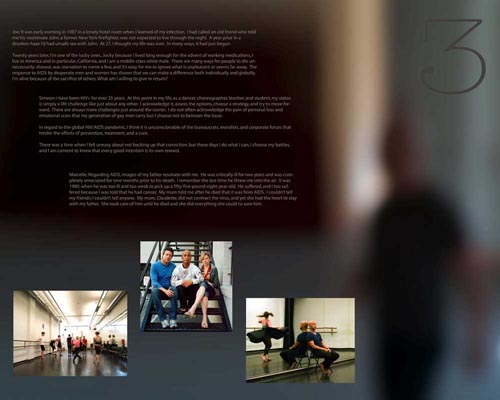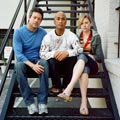
Joe Hogan, Simeon Den, and Marcelle Little each have their own stories to share in the 'Photo-Chronicling HIV in Los Angeles' project with Gideon Mendel.

Simeon Den choreographs with a group of dancers at a studio in Hollywood.

Simeon Den works with a twirling dancer on technique.

Simeon Den smiles as he leads a dance run-through at the school where he teaches.
|
|
Simeon Den Photographer: Joe Hogan Journalist: Marcelle Little |
Joe: It was early evening in 1987 in a lonely hotel room when I learned of my infection. I had called an old friend who told me his roommate John, a former New York firefighter, was not expected to live through the night. A year prior in a drunken haze I'd had unsafe sex with John. At 22, I though my life was over. In many ways, it had just begun.
Twenty years later, I'm one of the lucky ones, lucky because I lived long enough for the advent of working medications, I live in America and in particular, California, and I am a middle-class white male. There are many ways for people to die unnecessarily: disease war, starvation to name a few, and it's easy for me to ignore what is unpleasant or seems far away. The response to AIDS by desperate men and women has shown that we can make a difference both individually and globally. I'm alive because of the sacrifice of others. What am I will to give in return?
Simeon: "I have been HIV positive for over 25 years and at this point n my life, my status is simply a life challenge like just about any other. I acknowledge it, assess the options, choose a strategy and try to move forward. There are always more challenges just around the corner. I do not often acknowledge the pain of personal loss and emotional scars that my generation of gay men carry but I choose not to bemoan the issue.
In regard to the global HIV/AIDS pandemic I think it unconscionable of the bureaucrats, moralists, and corporate forces that hinder the efforts of prevention, treatment, and a cure.
There was a time when I felt uneasy about not backing up that conviction but these days I do what I can, I choose my battles and wars, and I am content to know that every good intention is its own reward."
Marcelle: Regarding AIDS, images of my father resonate with me. He was critically ill for two years and was completely emaciated for nine months prior to his death. I remember the last time he threw me up into the air. It was in 1989, when he was too ill and too weak to pick up a fifty-five-pound, eight-year-old. He suffered, and I also suffered because I was told that he had cancer. My mum told me after he died that it was from AIDS. I couldn't tell my friend. I couldn't tell anyone. My mum, Claudette, did not contract the virus, and yet she had the heart to stay with my father. She took care of him until he died and she did everything she could to save him.

